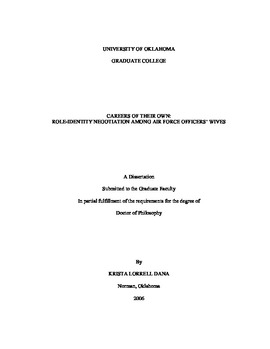| dc.contributor.advisor | Scott, Wilbur J., | en_US |
| dc.contributor.author | Dana, Krista Lorrell. | en_US |
| dc.date.accessioned | 2013-08-16T12:20:00Z | |
| dc.date.available | 2013-08-16T12:20:00Z | |
| dc.date.issued | 2006 | en_US |
| dc.identifier.uri | https://hdl.handle.net/11244/967 | |
| dc.description.abstract | The purpose of this study is to explore how a military officer's wife, one foot on each meandering path, might navigate simultaneously her careerist and traditional wife roles. Specifically, this study asks the following: In their own words, how do Air Force officer wives define "career"? How does the military lifestyle impact the careers of these women? What obstacles and opportunities do they perceive? By what adaptive processes might career-oriented Air Force officer wives achieve both career satisfaction and commitment to their traditional military role? Finally, what does it mean to be a careerist-traditional wife, and how do such career trajectories proceed over time and multiple relocations? | en_US |
| dc.description.abstract | Drawing on a symbolic interactionist perspective and on respondents' personal definitions of "career, " this research details the strategies, innovations, and explorations some career-seeking wives have employed over the course of their affiliations with the military. Data include 93 preliminary survey responses and 15 in-depth, oral life history interviews gathered from Air Force officer wives. Each interview respondent claims a careerist identity, participates in traditional military activities, and has experience living overseas. Each semi-structured, retrospective interview, then, explores the career trajectory of the respondent, the contextual obstacles and opportunities she perceives, the behavioral strategies and cognitive adjustments she employs, and the individualized identity meanings she attaches to her self-defined role. Analysis explores the military lifestyle as it is perceived by these careerist-traditional wives, the behavioral and cognitive adaptations they undertake, and the implications of their recollections. Substantive findings outline strategies for career-seeking spouses and suggest some future directions for advisement, policy, and research. Theoretical implications support and expand the principles of sociological identity control theory. Specifically, the experiences of these women indicate that individuals act to verify identity meanings not only through behavioral adjustments but through cognitive and definitional adjustments as well. As such, this research extends identity control theory. It clarifies both how role-identity definitions change over time at the individual level and, in the interactionist perspective, how those meanings are behaviorally negotiated at the social level, cumulatively affecting normative change. | en_US |
| dc.format.extent | xii, 297 leaves : | en_US |
| dc.subject | Officers' spouses United States. | en_US |
| dc.subject | Sociology, Individual and Family Studies. | en_US |
| dc.subject | Women's Studies. | en_US |
| dc.subject | Military Studies. | en_US |
| dc.subject | United States. Air Force Military life. | en_US |
| dc.subject | Psychology, Social. | en_US |
| dc.subject | Air Force spouses United States. | en_US |
| dc.title | Careers of their own: Role-identity negotiation among Air Force officers' wives. | en_US |
| dc.type | Thesis | en_US |
| dc.thesis.degree | Ph.D. | en_US |
| dc.thesis.degreeDiscipline | Department of Sociology | en_US |
| dc.note | Adviser: Wilbur J. Scott. | en_US |
| dc.note | Source: Dissertation Abstracts International, Volume: 66-12, Section: A, page: 4544. | en_US |
| ou.identifier | (UMI)AAI3203486 | en_US |
| ou.group | College of Arts and Sciences::Department of Sociology | |
